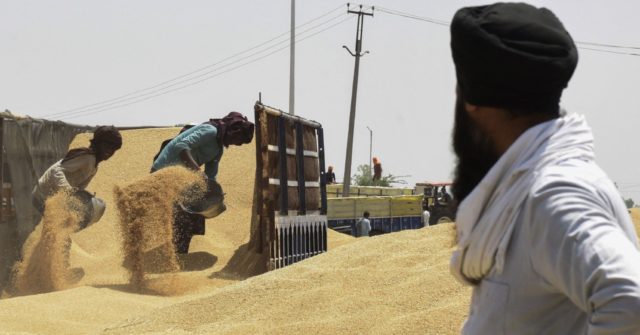Wheat prices set a new record in Europe and the ban on product exports to India further increased famine fears.
The price of wheat on the Euronext exchange hit an all-time high on Monday morning, with the latest increase due to the ban on exports of most wheat from India.
The war in Ukraine caused wheat prices to soar, while the effects of the drought in India have now forced the country’s authorities to ban exports of most crops.
According to the report MirrorThe price of wheat reached 435 euros (~$454) per ton on Monday morning as supplies from Ukraine, India and even parts of Europe were also experiencing drought.
This prompted EU members to voice their concerns about the imposition of export bans on various requested goods by various countries, including India.
“This is a big concern” about tightening export bans as the bloc is now working with the US to ensure food security, EU trade chief Valdis Dombrovskis told CNBC.
“We agreed with the US on the coordination and cooperation of our strategies in this area, because … In response to Russia’s aggression against Ukraine and the consequent rise in food prices and concerns about the country’s food security, they are starting to export. -restrictive measures,” he continued.
“We think this is a trend that can only make the problem worse,” describing in particular Indonesia’s upcoming ban on palm oil exports as “something that will only make it worse”.
Global food crisis: cut EU bureaucracy to boost wheat production – agriculture ministers://t.co/1xsROCtKi4
– Breitbart London (@BreitbartLondon) May 13, 2022
As the bloc tries to accept the fact that the food supply in Europe will become more volatile in the coming months, the European Commission has officially revised its official growth forecast downward.
According to this POLITICSWhile EU officials now expect the bloc’s overall growth to be capped at 2.7% this year, euro zone inflation looks set to hit a dizzying 6.9% this quarter.
However, despite these bleak prospects, Union economic czar Paolo Gentiloni insisted that the term “stagflation” should not be used to describe the current situation and that the European economy continued to grow.
“We have a very high inflation rate and one of the deepest declines. [revisions] for growth in our seasonal forecast. But it has not yet brought growth into negative territory,” he said.
“I’m not a strong supporter of the word “stagflation” as it is used in the same and different contexts, but we actually have very high inflation and relatively low growth,” he said.
While not all of these figures are negative, this published estimate reportedly does not take into account the possibility of Russia deciding to cut gas supplies to the continent, as it did in Poland and Bulgaria.
However, if such a measure is implemented, POLITICS He said that inflation in the bloc would rise to about nine percent and that countries heavily dependent on supply from Moscow, such as Germany, would enter recession.
Source: Breitbart
